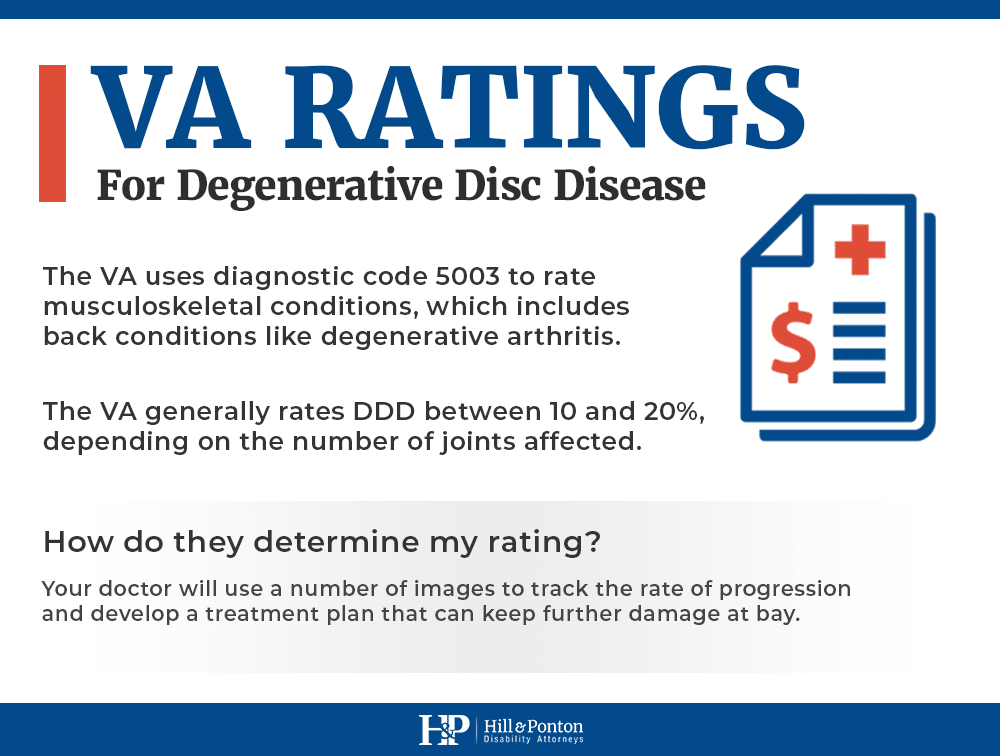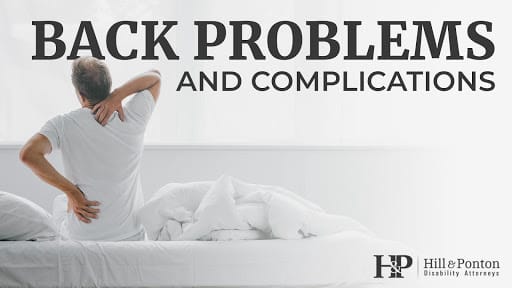Degenerative disc disease is a painful spinal condition that can affect daily life. If you developed degenerative disc disease as a result of military service, you may be eligible for disability benefits through the U.S. Department of Veterans Affairs. Knowing how VA ratings for degenerative disc disease are determined is crucial.
This guide will outline the basics of degenerative disc disease, how to prove service-connection and the general rating formula that the VA uses for this condition.
What Is Degenerative Disc Disease?
Degenerative disc disease (DDD) is a relatively broad term that has been applied to a number of different disorders of the spinal cord, including degenerative arthritis. This condition occurs when a spinal disc wears down over time, leading to back pain. It most often appears in the lumbar or cervical spine. Everyone will suffer from some degree of spinal disc damage as they age, but DDD most often refers to discs that have been worn down due to any number of factors (e.g., time, excessive force, etc.).
Symptoms of DDD include the following:
- Lower back pain
- Pain in the buttocks or upper thighs
- Intense pain upon sitting
- Intermittent pain that can last for up to several months
- Muscle spasms or tension
- Pain upon bending, twisting, or lifting
- Numbness in the back, arms, or lower extremities
The pain and stiffness from these symptoms may cause limitation of motion, especially during flare-ups. Lower back pain (lumbosacral pain) is an extremely common ailment and can be confused with any number of disorders, including spinal cancer, arthritis, and sciatica. Even infections of the spine may be confused with DDD.
Some veterans may experience intervertebral disc syndrome as well, which is classified as incapacitating episodes due to the breakdown of the spinal discs. The condition is similar, but the VA rates this condition under another schedule of ratings.
Service Connection for Degenerative Disc Disease
There are a number of activities that can exacerbate degenerative disc disease, including heavy lifting and other physically demanding tasks. However, it is possible to develop DDD for reasons that have nothing to do with military service. For instance, your discs are primarily made of water when you’re young. The natural aging process can cause them to dry out and lose their functionality. However, if you can show that your discs were torn at the outer core because of your service duties or that you sustained an injury that led to disc damage, then you may be able to show a service connection for the disability.
VA Claim for Degenerative Disc Disease
If you file, you’ll need the following to start a Degenerative Disc Disease (DDD) claim:
- A current diagnosis from a qualified medical professional
- A description of the events or activities that led to disc damage
- A letter from your doctor that states the Degenerative Disc Disease (DDD) is directly because of time served in the military
Your spinal discs do not receive the same blood supply that other parts of the body do, making them unable to repair themselves. If you believe you have DDD, it’s important to have your body examined by a doctor to understand more about its progression and future outcome. The degree of physical exertion required by the military, especially during active duty, can very easily lead to disc disease. For example, you might develop this condition over time if you were in charge of loading supplies day in and day out for several years.
You should also know that a disability rating can be achieved whether you developed DDD on-base or off. As long as you were officially serving in the military at the time, the damage did not have to occur when you were considered to be on duty.
Secondary Service Connection for Degenerative Disc Disease
You can file for DDD as a secondary service condition, depending on how it occurred. Certain injuries can inevitably lead to disc damage, even if it takes several decades to manifest. You do not have to file for a secondary condition at the same time as the primary condition. If you believe that your degenerative disc disease has now developed due to a primary disability, you can still apply even if you’ve already been approved for disability.
So, if you suffered from an ankle injury during military service and never fully recovered, you may find that the residual pain in the ankle causes you to walk differently. Your adjusted gait can put more strain on your back, and eventually lead to tearing of the discs. As long as you can show that one disability directly led to the other, you can apply for a secondary service connection for DDD.
The process of filing for a secondary service connection is similar to filing for a primary condition and will require a current diagnosis from your doctor. In addition, your doctor will need to state in a medical nexus (letter) that they believe that your primary condition from the service directly caused the degenerative disc disease. The more information you can give your doctor, the more likely you are to be approved.
Compensation & Pension (C&P) Exams for Degenerative Disc Disease
To successfully receive a disability rating for DDD, you’ll need to first submit your information to the VA Regional Office (RO). The RO will review the data, and determine whether you need a Compensation & Pension (C&P) exam with a VA doctor.
During this exam, the VA examiner will ask you many of the same questions that your doctor asked you in order to determine a service connection. They’ll inquire as to the level of pain, the total duration of your symptoms, and what your duties were when in the military.
While you are not being treated for degenerative disc disease by the C&P doctor, you are being evaluated for an official diagnosis. The doctor may consider other conditions for your back pain which your doctor may or may not have tested for. They will then come to their own conclusions separate and apart from your doctor and send their findings to the RO.

How VA Rates Degenerative Disc Disease (DDD)
The VA uses diagnostic code 5003 to rate musculoskeletal conditions, which includes back conditions like degenerative arthritis. This rating schedule considers factors like range of motion when awarding a specific percent rating. So, individuals with a low range of motion and other severe symptoms will receive a higher VA disability rating for DDD.
The VA generally rates degenerative disc disease between 10 and 20%, depending on the number of joints affected. Your doctor will use a number of images to track the rate of progression and develop a treatment plan that can keep further damage at bay.
However, in some cases, the VA has been known to give higher ratings to veterans who exhibit more severe symptoms. For example, one service member who presented with spinal stenosis (narrowing of the canal) and spinal nerve damage received a 60% rating. A 100% rating is needed before the VA considers a veteran to be entirely incapable of working.
The RO is accustomed to evaluating multiple conditions for a single veteran and will take into account both your doctor’s statements and the VA doctor’s statements before making their final decision.
VA Disability Benefits for Bulging Discs
As discussed above, the VA typically assigns a Veterans Disability rating of between 10 and 20% for degenerative disc disease. Keep in mind that that rating can be increased if there is a herniated disc or a bulging disc that causes a doctor to prescribe bed rest, specifically six weeks or more over a year’s time period. As the impairment becomes increasingly impactful on your life and employability your case for monthly compensation will become more solid.
Throughout this entire process of being evaluated for back-related medical conditions, be sure to keep track of all relevant medical evidence, x-rays, and medical records. Oftentimes well organized and traceable medical evidence can fulfill the rating criteria that the VA is ultimately looking for. In combination with unemployability, proof of your condition worsening can lead to the highest levels of VA disability compensation.
Was Your DDD Claim Denied?
If your VA claim for degenerative disc disease was denied or rated too low, a VA disability attorney can help. At Hill & Ponton, we have extensive experience fighting for veterans to secure the compensation they are entitled to.
Get started with a free, confidential, no-obligation case evaluation today →


